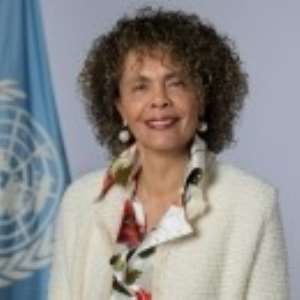
The economic toll of COVID-19 is having a negative impact on energy access and the chances of obtaining clean energy for all by 2030.
Renewal energy, digitalization and nature-based solutions to climate change and environmental degradation should be the cornerstone of an inclusive and resilient post-COVID green recovery in Africa, participants at the Africa Day event at the UN High-level Political Forum (HLPF) heard today.
In Africa’s response to the COVID-19 pandemic lies an opportunity to rethink how the continent approaches growth and development; its management of the environment and natural resources; and how to “leverage the existing tools and knowledge to build forward, build greener and build better,” said the Special Adviser on Africa to the UN Secretary-General Cristina Duarte at the onset of the virtual event.
“Digitalization can be a game changer,” Ms. Duarte said. With COVID-19 changing the way people keep in touch or transfer money and how students receive education, addressing the digital divide will help reduce inequalities in Africa. It was noted that about 250 million primary and secondary school students in sub-Saharan Africa were impacted by school closures during the pandemic, while in other parts of the world, students continued to learn online.
With the theme: “The Green Recovery: Renewable Energy, Digitalization and Nature-based Solutions for Inclusion and Resilience in Africa,” the Africa Day event was co-organized by the Office of the Special Adviser on Africa (OSAA), the Economic Commission for Africa (ECA), the UN Development Programme (UNDP) and African Union Commission (AUC).
Africa Day at the HLPF is a platform for African Member States and other stakeholders to share experiences and best practices. It is held every year as a side event to the High-Level Forum.
Digitalization can be a game changer.
Cristina Duarte
Special Adviser on Africa to the United Nations Secretary-General
This year, the Africa Day took place on the same day the AU launched its Green Recovery Action Plan. The plan is centered around climate finance, renewable energy, nature-based solutions, resilient agriculture, and green and resilient cities.
Energy, the heartbeat of production
However, at the heart of sustainable recovery lies easy access to energy. And for a green recovery, access to clean energy is key.
Narrowing the digital divide without adequate access to energy would be practically impossible, the meeting heard.
Today, across the African continent, 900 million people do not have access to clean, safe fuels and technologies to cook, heat, or light their homes, UNDP’s Regional Director for Africa, Ms. Ahunna Eziakonwa pointed out.
And just like digitalization, post-COVID recovery offers an immense investment opportunity to scale up energy access because, “the importance of energy goes beyond the economic rationale. It drives the provision of social services – like health, education and safe cooking,” said Ms. Eziankonwa.
Earlier, the importance and ripple effect of access to clean energy was highlighted by Damilola Ogunbiyi, the Special Representative of the UN Secretary-General for Sustainable Energy for All, when she remarked that for every $1 invested in clean energy in any country, there’s about 0.93 cents to GDP; and that if you give a woman access to sustainable energy, she earns 59% more.
In an interview with Africa Renewal, Ms. Ogunbiyi noted that: “Even if you have a long wish-list of things you want to spend money on, clean energy is where you should focus more because it's just good math in terms of economic growth.”
Still, in efforts to ensure access to energy to more people, there is a need to find solutions that are rooted within communities and societies. “And nature‑based solutions, such as reforestation, “offer some of the best opportunities to do so,” said Vera Songwe, the Executive Secretary of the United Nations ECA.
However, “the first step is to ensure increased supplies of vaccines against COVID-19 across Africa. For as long as this is not done; and we are currently at less than 3% of the African population vaccinated, any talk of recovery and resilience becomes doubly challenging,” warned Albert Muchanga, the AU Commissioner for Economic Development, Trade, Industry and Mining.
For more information on COVID-19, visit www.un.org/coronavirus
Africa Renewal




 We’ll no longer tolerate your empty, unwarranted attacks – TUC blasts Prof Adei
We’ll no longer tolerate your empty, unwarranted attacks – TUC blasts Prof Adei
 Bawumia donates GHc200,000 to support Madina fire victims
Bawumia donates GHc200,000 to support Madina fire victims
 IMF to disburse US$360million third tranche to Ghana without creditors MoU
IMF to disburse US$360million third tranche to Ghana without creditors MoU
 Truck owner share insights into train collision incident
Truck owner share insights into train collision incident
 Paramount chief of Bassare Traditional Area passes on
Paramount chief of Bassare Traditional Area passes on
 Two teachers in court over alleged illegal possession of BECE papers
Two teachers in court over alleged illegal possession of BECE papers
 Sunyani: Victim allegedly shot by traditional warriors appeals for justice
Sunyani: Victim allegedly shot by traditional warriors appeals for justice
 Mahama vows to scrap teacher licensure exams, review Free SHS policy
Mahama vows to scrap teacher licensure exams, review Free SHS policy
 Government will replace burnt Madina shops with a new three-story, 120-store fac...
Government will replace burnt Madina shops with a new three-story, 120-store fac...
